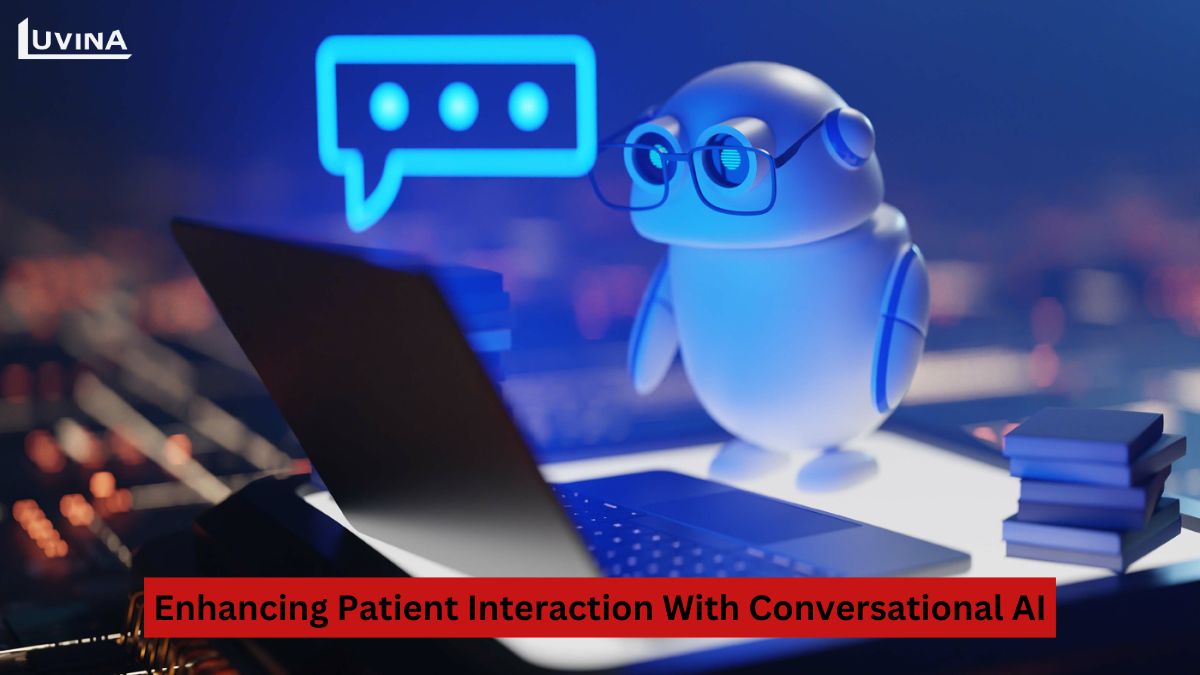A survey showed that as many as 82% of healthcare consumers would switch to some other provider in case of a disappointing experience. To improve operations and elevate the quality of patient care, conversational AI in healthcare has become a powerful tool, giving healthcare providers a strong competitive advantage. In an era where technology is reshaping almost every industry, conversational AI is showing its value and strength even more clearly.
In the article below, let’s explore the benefits of conversational AI and conversational AI use cases in healthcare to see how modern technology is changing this industry.
Conversational AI in healthcare market
The healthcare sector is one of those that have undergone remarkable and deep variations with the integration of AI technologies. Among these, conversational AI in healthcare is considered a revolutionary tool, offering fluid and highly personalized experiences for both patients and healthcare providers.
The Conversational AI in healthcare market is expected to experience extreme growth between 2024 and 2034, with revenues projected to increase by hundreds of millions of dollars. As such, by 2023, it had already captured a market share valued at $10.7 billion, creating a firm foundation for explosive growth in the coming years. It is therefore estimated to grow by 29.8 billion dollars by 2028 and reach 49.9 billion dollars by 2030.

Currently, the rising number of chronic illnesses and an aging population are driving demand for healthcare services, requiring conversational AI to step in and help reduce the burden on healthcare professionals while improving care quality. Since most healthcare systems in countries embark on rapid digital transformation, conversational AI in healthcare will continue to grow, opening up new and promising avenues for improving healthcare services.
What is conversational AI in healthcare?
More than just an advanced chatbot, conversational AI in healthcare is a highly sophisticated technology that leverages natural language processing, machine learning, and deep contextual understanding to interact with patients. Unlike traditional chatbots, conversational AI goes beyond pre-set scripts, mimicking human interactions to comprehend and respond to complex queries within the healthcare context.
Conversational AI use cases in healthcare meet a wide range of healthcare needs. With this technology, healthcare processes become feasible, robust, and highly adaptable. Natural language processing enables the system to analyze text structure and meaning to understand user queries and engage in dialogues as naturally as a human would. Meanwhile, machine learning algorithms allow the system to learn from interactions, adapting and enhancing responses over time.

In healthcare, conversational AI is often integrated with existing systems like electronic health records, customer relationship management systems, or operations management systems. This integration allows it to access relevant information, providing more accurate and context-sensitive responses. The synergy with these systems enables conversational AI to offer a personalized and interactive experience, meeting the specific needs and challenges of different patient groups and healthcare providers, far surpassing traditional chatbots.
A very large international health system, for example, with thousands of patients who cannot speak English, could support dozens or hundreds of languages with conversational AI tools. The technology could enable a patient to search for and retrieve information in their native language, making accessibility and interaction more effective, therefore improving the quality of care.
Benefits of using conversational AI in healthcare?
Conversational AI use cases in healthcare are creating positive impacts on both patients and healthcare providers. Some of the key benefits are listed below:
Benefits of Conversational AI in healthcare for patients:
- Accessibility of information: 24/7 functioning AI systems provide them with reliable answers to all questions and queries without much waiting in a queue.
- Enhanced patient engagement: Chatbots can send reminders for medication, follow-up appointments, and health tips to help patients maintain a healthy lifestyle, keep up with appointments, and adhere to medication schedules.
- Personalized support: The AI adjusts healthcare guidance based on each patient’s health status, medical history, and personal preferences, ensuring they receive relevant and practical advice.

Benefits for healthcare providers:
- Smarter workflow: Automating administrative tasks such as appointment scheduling, prescription refills, and patient monitoring results in less administrative work for healthcare staff.
- Increased patient outreach: Virtual assistants can send out care reminders, follow-up messages, and health tips; this can engage more patients to follow planned care and healthy behaviors.
- Enhanced patient data collection: Facilitates the collection of patient feedback and real-time health data, giving healthcare providers valuable insights into patients’ health conditions and treatment effectiveness.
- Cost savings: Reducing the need for manual calls and human interactions helps healthcare providers significantly lower costs.
Conversational AI use cases in healthcare
Conversational AI in healthcare is now being applied and transforming many aspects of operations in this industry. Below are some of the most popular and effective use cases.
1. Symptom checkers and triage tools
When facing minor health issues, we often turn to Google for answers. While the internet might be a good resource, it will never make personal advice possible for us. That is why symptom checkers and triage tools are among the most notable applications of Conversational AI in healthcare.
It works by first having the patients describe their symptoms to the system through a conversation. The AI uses NLP to understand the input information, while the machine learning models will then compare symptoms against an extensive database of medical conditions. From this point, AI is able to list potential diagnoses, guide patients through symptom checks, provide triage, and even go on to offer suggestions such as seeing a doctor or seeking emergency care.
These conversational AI systems can further ask questions in relation to and can frame such that the condition of a patient is considerably understood for giving advice. This easy accessibility of guidance at any time reduces unnecessary visits to healthcare facilities. Notably, even patients who have limited fluency in the language used by the chatbot can also receive medical support through conversational AI. In some cases, conversational AI is already considered to deliver better diagnoses and triage than certified professionals due to its in-depth symptom explorations and patient history.
2. Chronic disease management
Some conversational AI healthcare companies integrate chronic disease management features into their systems. Such systems are much more effective in managing diseases like diabetes, asthma, and hypertension through continuous support to patients in medicinal cycles, keeping track of their symptoms, and adjusting suggestions about lifestyle based on real-time data. Diabetic patients receive day-to-day reminders to check their blood sugar and report symptoms, among others.

Beyond reminders, clinical music physicians can also record test results through audio recordings and attach these to patients’ medical records. When the patient calls to ask about test results, healthcare providers will use pre-recorded audio from physicians or convert text to speech to convey test results, allowing patients to talk directly with a healthcare professional, if necessary.
3. Mental health chatbots
One of the most excellent conversational AI use cases in healthcare involves mental health chatbots, which will provide initial emotional support through self-reporting, gamification of positive habits, or daily check-ins as a way to cope with mental health problems. Moreover, conversational AI complements mental health care when necessary.
For example, AI will refer patients to relevant resources or put them in contact with a human counselor if it detects severe distress signals and/or the risk of self-harm. On this note, conversational AI allows for the continuous, available, and scalable support that traditional services cannot offer, as it helps patients to improve their mental well-being.
>> Also read: AI Chatbot Development Service: Custom Solutions for Your Business
4. Virtual assistants for hospitals
The most valuable resource of hospital staff is wasting a lot of time doing daily administrative work. For example, to do their job, they have to log in to several applications and search among many forms, and keep track of various departments, which apart from wastage of time may infuriate the patients. Contrarily, an advanced conversational AI platform can become a virtual assistant in hospitals and simplify the entire process.
While doing so, conversational AI in healthcare can manage routine tasks such as appointment scheduling, patient check-in, and record management with much ease of workload for the healthcare staff. This way, hospitals and healthcare facilities can employ chatbots to process payments, insurance requests, complex bills, detailed invoices, and claims issues efficiently.
Moreover, conversational AI can be implemented bedside for easier communication between the patient and healthcare provider to make the experience more pleasant while reducing consultancy wait time and lost calls.

5. Appointment management
It has been recorded that missed appointments cost healthcare providers up to $150 billion annually, which unnecessarily wastes the time of the staff and prolongs the wait times of other patients. This is the reason why healthcare providers are constantly seeking means of smoothing the scheduling process, and conversational AI has been considered one of the clear-cut tools for doing so. The conversational AI in healthcare tools uses natural language processing to decode patient requests across various means of communication, including voice calls, text messages, and online chatbots.
It then retrieves, in real-time, the availability status of healthcare providers for new appointment bookings, verification of existing appointments, cancellations, or any changes in appointments. Such systems prove to be quite efficient in case of appointments during odd hours, in last-minute rescheduling, reducing administrative burdens, and easing congestion on phone lines for more urgent calls.
6. Medication reminders and adherence
AI-powered medication management tools integrate with patients’ electronic health records to access their medication schedules. The system then sends personalized medication reminders, encouraging patients to take their prescribed medication and improve adherence. Additionally, the system can provide information about medications, such as dosage instructions and potential side effects, helping patients understand and comply with medication more strictly.
7. Telemedicine integration
Conversational AI is now widely used in telemedicine, recording patient interactions, summarizing key points, and updating electronic health records in real time. Furthermore, conversational AI can provide real-time language translation services, making telehealth accessible to patients who do not speak English.

8. Answering questions and inquiries
Patients often have questions that need immediate answers but don’t want to bother healthcare staff, as they prefer self-service. In this case, Conversational AI in healthcare is the best solution for self-service in healthcare. NLP provides helpful answers to all questions without requiring patients to search through various sources. Additionally, conversational AI can match suitable responses to a question even when the answer differs significantly among users and doesn’t correspond to exact terms on the website.
How to Luvina help in implementing conversational AI in healthcare?
From 2024 to 2030, the global healthcare AI industry is projected to grow at an impressive compound annual growth rate (CAGR) of 35.8%. This extraordinary growth rate indicates that as the industry expands, the demand for technological solutions to enhance patient engagement and streamline processes will also increase. Conversational AI solutions will become increasingly common and as important as traditional medical tools. Partnering with Luvina can help healthcare providers seamlessly integrate conversational AI into their systems.
With Luvina’s deep understanding of Healthcare 4.0, we offer approaches that help clients achieve higher automation and efficiency, innovate products and services, modernize infrastructure, and deliver better results with sustainable costs. Luvina is proud to have supported numerous healthcare businesses in securing information, optimizing healthcare processes, and developing specialized care services for the elderly, people with disabilities, and even pets. Some of the services we provide include:
- Patient Information Management: We offer a secure, simple, and professional internal system to store and manage patient information.
- Medical Supplies Management: Our solution goes beyond paperwork, ensuring compliance with requirements and accurately tracking medical equipment.
- Home Health Care Management: Luvina has experience working with management systems that include features like scheduling, patient information management, and care plan management to coordinate and oversee healthcare services provided at home.
- Hospital Fee Management: We calculate healthcare service costs from various sources. Luvina has expertise in handling payments for the National Health Insurance Association and patient payments.
- Independent Health Support Services: We operate a management system that meets the highest standards to improve the quality of life for people with disabilities.
By partnering with Luvina to integrate conversational AI in healthcare, you will benefit from:
- – The highest data security with infrastructure that complies with international standards (ISO 27001).
- – 24/7 continuous communication, regardless of time zones.
- – Experience high-quality service certified by ISO 9001 and CMMI Level 3.
Luvina is always ready to create innovative solutions tailored to your unique needs. Contact our consultants directly today for specialized services for your project or company. thing is to carefully assess your needs to make the right choice.
Related Posts:









Read More From Us?
Sign up for our newsletter
Read More From Us?
Sign up for our newsletter